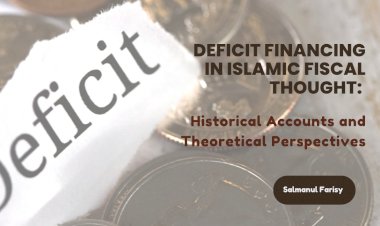Financial Transactions and Wealth Management in the Light of Higher Objectives of SharīʿAh -(Part -2)
TRANSPARENCY (WUḌŪH)
Transparency, which is meant to avoid harm and disputes as much and as possible, constitutes one of the higher objectives in wealth management and financial transactions. In order to achieve this goal, the Sharīʿah stipulated the documentation, pledges and witnesses as the essential parts of the transaction.
The documentation occupies a dominant position in the exercise of Islamic finance. The famous scholar Abu' Abd Allah Muhammad bin 'Abd al-Salam al-Hawwari (d. 749 AH) underlined: "Documentation studies have a significant position and vital role for it regulates people's matters in conformity with the Sharīʿah rules and preserves their blood and wealth in line with applicable standards".
The holy Quran underscores the importance of documentation: "O you who have believed, when you contract a debt for a specified term, write it down" (al-Baqarah: 282). This verse sheds light on the concern of Sharīʿah in documentation in a transaction for the protection of the individuals' properties. The Quran's style is of the shortest expression that carries the broadest meanings; thus the debts are not used for excluding other contracts, but all other transactions are incorporated in the injunction mentioned above. Al-Hafiz ibn al-Arabi derived more than 50 legal rules in the light of the above verse, that is the fact which shows the inimitability of al-Quran (iʿjāz al-Quran). For referring to debt, the Quran used the word "al-tadāyn" (dealings based on debt) that is more comprehensive to comprise of debt and other forms of sale than "al-qarḍ" (to give loan). One form of trade involving debt is that a successful trader sometimes needs to give debt as part of conducting bigger transactions.
The contracts of trades that involve the debt are built upon the lenient approaches and kindness where sometimes people are reluctant of doing documentation out of shyness. However, this shyness is reprehensible and unwelcome. Therefore, if the documentation is needed in the contracts of debts, then it is more crucial in all other sales and financial transactions.
The injunction of Quran for the documentation meant to be an instrument to remember the agreements when the date is due, which could also be used to get rid of disagreements and disputes that come out of forgetfulness and negligence. In the documents, the contracting parties must scribe all relevant specifications to regulate the wordings, statements and conditions of the contract; these details sometimes become important for the judge to issue a sentence if the parties disagree each other later. Allah emphasizes in verse "And let a scribe write [it] between you in justice" (al-Baqarah: 282) that the contracting parties have to choose a scribe who is religious, knowledgeable of rulings and prudent in actions. By doing so, the contract becomes free from all factors that may cause make it invalid. This verse encourages the scribe to offer his work of writing with due care and sometimes his duty becomes obligatory. The scribes have to use the words and statements that are clear and free from causing disputes in future. Therefore, the scribes must know the terms of the contract perfectly. Imam Malik said, "The agreements must be written by a knowledgeable person who is pious and trustworthy."
As much as people adhere to the teaching of Sharīʿah, they keep themselves away from the reasons for dispute and disagreements. In addition, it increases in their minds God's consciousness and it protects them from mischiefs and corruption. In the verse of debt (al-Baqarah: 282), Allah warns, "For if you do so, indeed, it is [grave] disobedience in you. And fear Allah". In the verse, Allah uses the word "fisq" (disobedience) that linguistically refers to 'going out of agreement' and technically means 'to violate the boundaries set by Allah'.
JUSTICE AND EQUITY (ʿADL)
The justice in wealth is achieved by facilitating the acquisition of wealth and property through trust-worthy and considerable methods excluding all the ways and means of cheating, contractual ambiguities and oppression. The spreading of equity and justice among people is of the basic objectives of Sharīʿah. Allah says, "We have already sent Our messengers with clear evidences and sent down with them the Scripture and the balance that the people may maintain [their affairs] in justice" (al-Hadid: 25). Justice in the financial transaction requires that the dealings must be carried out in transparency and in line with market standards in exchange and transfers. It leads to smooth-running of business and growth of markets with healthy competition.
Also Read:Financial Transactions and Wealth Management in the Light of Higher Objectives of SharīʿAh Part -1
The principle of justice demands the people to avoid transactions that are ambiguous and uncertain. In the case of ambiguity, the parties of the contract remain unaware of the procedures and unable to make an informed decision. The dealings comprised of deception and cheating (tadlis) are against the concept of justice. In the discussions of financial transactions, tadlis means 'dealing in that the seller conceals the defects of the object for deceiving the buyer'.
Allah says: "That you do not transgress within the balance. And establish weight in justice and do not make deficient the balance" (al-Rahman: 8-9). "Woe to those who give short weight, who, when they take by measure from others, take it fully, and when they measure or weigh for them, they give them less than what is due. Do they not think that they will be raised up again on a Great Day? (al-Mutaffifeen: 1-4).
The above verse refers to a prevalent evil practice in commercial dealings. It relates that people who do fraud in measuring and weighing must remember the day that necessarily is to come up hereafter in which they will be questioned for their actions. Allah says "And Give full measure and weight in justice, we do not charge anything except its capacity" (al-An'am: 153). Ibn Ashur denoted that the prohibition of fraud dealings emphasizes the justice in that as it is obvious in the statement of Prophet Shuʿayb: "And do not decrease from the measure and the scale" (Hud: 84). These verses shed light on the fact that all the dealing should be fulfilling the due amount in terms of weighing and measurement that is commensurate to the justice in the particular situation and should not be decreasing from the mentioned amount.
The transfer of wealth takes place in three forms:
- Compensation of work or property.
- Charity or contributions.
- Inheritance
CONCLUSION
Islam as the comprehensive way of life embraces all dimensions of life with its own unique guidelines and principles that govern human life along with definite and higher objectives behind each action and order. From the basic sources of Sharīʿah, i.e. the Quran and Sunnah, the erudite scholars tried to proffer the minutia of social and interpersonal relationships of an individual as well as the relationship with Allah. One of the primary objectives of Sharīʿah is the preservation of wealth (ḥifẓ al-māl) and the Islamic law is replete with the instructions to make the transactions and exchange of wealth and property healthily and fairly. For the excellent wealth management and fair financial interactions, people have to make sure mainly four factors that are Stability, marketability, transparency and justice.
[The original article written in Arabic is published in the book entitled Ta'ammulāt wa Anẓār fī al-Tashrīʿ wa al-Ḥayāt "Reflections and Reviews on Islamic Legislation and Life" published by Dār al-Īmān, UAE, 2013, pp. 33-46. The translated article was initially published in Muslim World League Journal, July 2017]
(Dr. Qais bin Mohammed al-Mubarak Professor of Islamic Jurisprudence, King Faisal University, Al-Ahsa)
Disclaimer
The views expressed in this article are the author’s own and do not necessarily mirror Islamonweb’s editorial stance.
























Leave A Comment